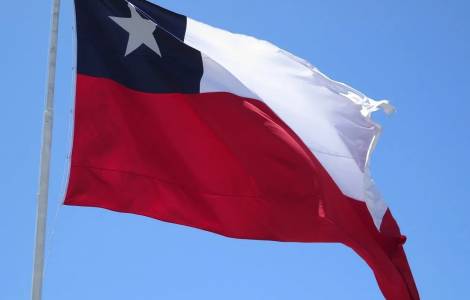
Santiago (Agenzia Fides) - "Next Sunday, May 7, we will have the opportunity to take a new step in the constitutional process that we are experiencing as a country, by electing the constitutional councilors, who, together with a group of experts, must present a new proposal for a political constitution for the nation. Beyond the mandatory nature of the vote, we believe it is a great responsibility to participate to cast our vote in an informed manner to be part of such an important process for our country". The invitation from the Chilean Bishops was expressed at the end of their recent Plenary Assembly, held in April (see Fides, 24/4/2023).
On May 7, in effect, 15 million Chileans must elect 50 representatives (25 women and 25 men) to draft a new Constitution, who will work together with the Commission of 24 experts appointed by Parliament. The Council will have five months to work on the project prepared by the experts. The final text will be submitted to a referendum on December 17. This new path became necessary after Chileans voted against the previous proposed draft in the popular referendum on September 4, 2022.
Thus, the convulsive path to provide Chile with a new Constitution continues, as its citizens demand, to replace the 1980 Charter, approved during the Pinochet regime. The long process has its origin in the street violence of October 2019, which began as protests over the increase in the price of public transport and triggered the most serious political and social crisis in the history of the Andean country seen in decades.
The violence, with attacks on people, destruction of property, looting of commercial premises and clashes with police forces, caused deaths and injuries in several cities. The government decreed a state of emergency. The Church, accused of widespread abuses, was also the victim of violence and assaults on places of worship, with the destruction of sacred images and vandalism in churches. The protests were an expression of the daily suffering and hardships of Chilean society in terms of work, health, citizen security, public education, housing, pensions, poverty and immigration problems, among others.
The referendum of October 25, 2020 sanctioned the demand for a new Constitution, adapted to the times and capable of responding to the needs of Chileans, whose drafting was entrusted to a "Constituent Convention", elected on May 15 and 16 2021. On March 11, 2022, the 36-year-old Gabriel Boric, student leader of the October 2019 protests, assumed the Presidency of Chile, who set out to radically reform the country's sociopolitical structure in a progressive direction. In the referendum of September 4, 2022, the majority of Chileans (more than 60%) expressed their negative opinion on the draft of the new Constitution, which had been widely debated and analyzed by the different components of society, the Catholic Church and representatives of religions.
The elections for the Constituent Councilors on Sunday, May 7, therefore open a new path, which we hope will be decisive in resolving the many problems facing the nation, and which have also been highlighted by the Bishops in their usual analysis of the social reality in the last Plenary: the serious security crisis, the levels of violence hitherto unknown, the increase in organized crime, often associated with drug trafficking, corruption...
In recent days, controversy has erupted in Chile due to the lack of information for citizens about these elections, which is why there is little interest on the part of everyone, although surely many will go to the polls since participation is mandatory and
not voting involves pecuniary sanctions. (SL) (Agenzia Fides, 5/5/2023)